-
Palestinian Digital Rights and the Extraterritorial Impact of the European Union’s Digital Services Act (DSA)
A new study examines discrimination and censorship concerns within the EU, affecting both Palestinians and global advocates for Palestinian human rights.
7amleh – Arab Center for the Advancement of Social Media — 10 April 2024 -
Mexico: Protect the Press
A new joint report found that Mexico’s Federal Mechanism for the Protection of Human Rights Defenders and Journalists failed to adequately evaluate risks journalists are facing, implements at times ineffective protective measures and lacks specialized knowledge of challenges to press freedom in Mexico.
Committee to Protect Journalists / Amnesty International — 8 March 2024 -
Racism and Incitement Index
An average of 23 violent or hateful pieces of content were published against Palestinians every minute after 7 October, reports 7amleh.
7amleh – Arab Center for the Advancement of Social Media — 26 February 2024 -
Israel-Gaza war brings 2023 journalist killings to devastating high
More than three quarters of the 99 journalists and media workers killed worldwide in 2023 died in the Israel-Gaza war, the majority of them Palestinians killed in Israeli attacks on Gaza. The conflict claimed the lives of more journalists in three months than have ever been killed in a single country over an entire year.
Committee to Protect Journalists — 20 February 2024 -
Climate and Environmental Journalism Under Fire
Journalists who cover climate and environmental stories are targeted by powerful private and state actors who are willing to go to great lengths to protect their lucrative interests linked to environmentally harmful activities.
International Press Institute — 13 February 2024 -
“I Can’t Do My Job as a Journalist” The Systematic Undermining of Media Freedom in Hungary
The Hungarian government’s interference with media freedom and pluralism, part of its systematic attack on the rule of law, obstructs the work of independent journalists in holding the authorities to account and prevents the public from accessing information.
Human Rights Watch — 13 February 2024 -
Media Capture in Greece: Entanglement of the Fourth Estate
This report examines media capture in Greece through the four indicators of media capture: capture of private media, capture of public media, capture of the system of funding media and capture of media regulators.
International Press Institute — 30 January 2024 -
WORLD REPORT 2024: HRW Annual Review Of Human Rights Around The Globe
“The international system that we rely on to protect human rights is under threat as world leaders look the other way when universal principles of human rights are violated.”
Human Rights Watch — 11 January 2024 -
Meta’s Broken Promises: Systemic Censorship of Palestine Content on Instagram and Facebook
Human Rights Watch found that the problem stems from flawed Meta policies and their inconsistent and erroneous implementation, overreliance on automated tools to moderate content, and undue government influence over content removals.
Human Rights Watch — 5 January 2024 -
Cambodia: Fundamental freedoms monitor report 2022
The report noted that the government’s crackdown on fundamental freedoms hindered public participation and undermined the advancement of democracy in Cambodia.
Cambodian Center for Human Rights (CCHR) — 19 October 2023 -
Media freedom at a crossroads: Journalism in Poland faces uncertain future ahead of election
MISSION REPORT ON MEDIA CAPTURE AND VEXATIOUS LAWSUITS IN POLAND
Media Freedom Rapid Response — 5 October 2023 -
Freedom on the Net 2023: The Repressive Power of Artificial Intelligence
Freedom House has found that while innovations in AI contributed to the 13th consecutive year of global decline in internet freedom, older forms of digital repression continued to proliferate.
Freedom House — 4 October 2023 -
“Scorched lands of journalism in the Amazon” – RSF report
The report contains previously unpublished data on the obstacles to press freedom, particularly for local journalists, in the Brazilian Amazon, a region at the heart of the global climate challenge.
Reporters Without Borders — 22 September 2023 -
Booklash: Literary Freedom, Online Outrage, and the Language of Harm
PEN America warns that social media blowback and societal outrage are imposing new moral litmus tests on books and authors, chilling literary expression and fueling a dangerous trend of self-censorship that is shrinking writers’ creative freedom and imagination.
PEN America — 16 August 2023 -
Sustainable Development Goals: On or off track? Assessing the progress through freedom of expression and information
As London hosts the Sustainable Development Goals (SDG) Summit, ARTICLE 19 releases a new briefing assessing the progress made towards meeting the SDG on freedom of expression and access to information.
ARTICLE 19 — 25 July 2023 -
Pakistan network shutdown report 2022
A report from Bytes for All showed that Pakistan faced 24 network shutdowns in 2022, which is 58% higher than in 2021.
Bytes for All — 9 July 2023 -
Latin America in a Glimpse 2023
A peek at the gaps shaping our experiences on the internet.
Derechos Digitales — 20 June 2023 -
Harassment of fact-checking media outlets in Europe
Survey finds that 90% of fact-checking outlets in Europe have been the target of online harassment and smear campaigns.
International Press Institute — 7 June 2023 -
The Unfreedom Monitor: Venezuela Country Report
The Unfreedom Monitor report provides insights into the current state of freedom in Venezuela and highlights challenges faced by journalists and media in the country.
Global Voices Advox — 6 June 2023 -
Finding 404: A report on website blocking in India
The report traces this form of censorship done through blocking of websites, applications, and social media accounts in India.
SFLC.in — 20 May 2023 -
Deadly Pattern: 20 journalists died by Israeli military fire in 22 years. No one has been held accountable
The May 11, 2022, killing of Al-Jazeera Arabic correspondent Shireen Abu Akleh is part of a deadly, decades-long pattern. Over 22 years, CPJ has documented at least 20 journalist killings by members of the Israel Defense Forces.
Committee to Protect Journalists — 15 May 2023 -
Fragile Progress: The struggle for press freedom in the European Union
The European Union is facing numerous challenges as it seeks new ways to uphold its commitment to press freedom. This special report examines the EU’s response to threats such as murders of journalists, pandemic-related media controls, spyware, and the war in Ukraine.
Committee to Protect Journalists — 27 April 2023 -
Privacy International’s comments on the zero draft of the WHO convention, agreement or other international instrument on pandemic prevention, preparedness and response (“WHO CA+”
PI welcomes the inclusion of a provision on confidentiality and privacy. But there are still significant gaps in the zero draft which need to be addressed to ensure the treaty puts the respect and protection of human rights at the centre of the prevention and response to future pandemics including ensuring the effective regulation of the private-sector entities.
Privacy International — 22 February 2023 -
Legal aid resources in Brazil: A guide for journalists facing legal action
CPJ has worked with local partners to compile this directory of resources providing different types of legal aid to help connect journalists in Brazil in need of legal support with the initiatives and organizations that can support them.
Committee to Protect Journalists — 14 February 2023 -
Hashtag Palestine 2022
This report diagnoses the state of digital freedoms, and outlines the most prominent patterns of digital rights violations and their trends during 2022.
7amleh – Arab Center for the Advancement of Social Media — 7 February 2023 -
Violations of media freedoms in Palestine – Annual Report 2022
A rise in serious violations against journalists last year included the murder of Shireen Abu Akleh and Ghufran Warasneh, documents a new report from Mada Center.
Palestinian Center for Development and Media Freedoms (MADA) — 1 February 2023 -
Mass Media in Belarus” No. 1 (71), 2023 Annual Review 2022
BAJ’s review of 2022 highlights 33 journalists in prison, 17 heavy prison sentences, and nine media outlets classified as “extremist organisations”.
Belarusian Association of Journalists — 22 January 2023 -
WORLD REPORT 2023 – HRW’s Annual Review Of Human Rights Around The Globe
A New Model for Global Leadership on Human Rights
Human Rights Watch — 13 January 2023 -
The IPI Database of Killed Journalists
This database contains information about journalists who have been killed in connection with their work. This could mean journalists who in IPI’s assessment have been directly targeted in retaliation for their work or journalists who have been killed while reporting, including while covering armed conflict.
International Press Institute — 29 December 2022 -
Let The Net Work: Internet Shutdowns in India 2022
The previous decade has witnessed an exponential increase in internet shutdowns in India with a total count of 690, out of which 110 had been implemented in the year 2021. The year 2022 has seen 75 shutdowns till the publication of this report.
SFLC.in — 26 December 2022 -
Report on the State of Freedom of Expression (FOE) in Malaysia 2022
This report documents cases of how repressive laws were used to curtail the right to speech, expression and assembly in Malaysia this past year.
Centre for Independent Journalism (CIJ) — 12 December 2022 -
Ukrainian Culture Under Attack: Erasure of Ukrainian Culture in Russia’s War Against Ukraine
Widespread destruction of Ukraine’s museums, theaters and libraries, the persecution of writers and artists, and other attacks against Ukrainian heritage expose the breadth of Russia’s attempts to erase the country’s cultural identity as a tactic of war, according to this report by PEN America and PEN Ukraine.
PEN America — 5 December 2022 -
Declaration of principles for content and platform governance in times of crisis
The Declaration of Principles for content and platform governance in times of crisis is an effort to advance consistent and rights-respecting principles for companies to respond appropriately to crises and meet their obligations and responsibilities under international human rights law.
ARTICLE 19 — 30 November 2022 -
To Sleep the Law: Violence Against Protesters and Unaccountable Perpetrators in Iraq
This report takes stock of progress made towards accountability for the killing and injuring of protesters and activists committed during, and in the wake of, the 2019-2020 uprising across central and southern Iraq.
Human Rights Watch — 29 November 2022 -
Who Gets to Tell Australian Stories 2.0
In partnership with the University of Sydney and University of Technology Sydney, Media Diversity Australia (MDA) has released this ‘report card’ on Indigenous and cultural diversity in television news, with insights into what has changed, what has stayed the same, and opportunities to lead the charge toward greater diversity.
Media, Entertainment and Arts Alliance — 22 November 2022 -
FREEDOM ON THE NET 2022
Countering an authoritarian overhaul of the internet
Freedom House — 18 October 2022 -
OHCHR Assessment of human rights concerns in the Xinjiang Uyghur Autonomous Region, People’s Republic of China
The report by the outgoing UN High Commissioner for Human Rights, Michelle Bachelet, contains victim accounts that substantiate mass arbitrary detention, torture, cultural persecution, forced labor, and other serious human rights violations, and recommends that states, businesses, and the international community take action with a view to ending the abuses, and advancing justice and accountability.
Human Rights Watch — 4 September 2022 -
2022 Elections: Defending Freedom of Expression.
ARTICLE 19 points out various aspects of the Brazilian electoral process, analyzing the many challenges the country faces from now until October 2022, and then after the elections and the transition, with the recurring threats to the reputation and integrity of the elections made by government officials and members of the armed forces.
ARTIGO 19 — 1 September 2022 -
“Through The Looking Glass: Digital Safety and Internet Freedom in South and Southeast Asia
With almost all independent media institutions eradicated, Cambodian people have been forced to rely largely on social media and other online platforms to access news and information.
Cambodian Center for Independent Media (CCIM) — 16 August 2022 -
Survey of attitudes towards Privacy and Data Protection in the Palestinian Context
New survey demonstrates an urgent need for comprehensive privacy and data protection Palestinian legislation that can protect all citizens’ right to privacy and ensure accountability.
7amleh – Arab Center for the Advancement of Social Media — 4 July 2022 -
Privacy and personal data protection in Palestine: Double violations and absent legislation
This report sheds light on the issue of privacy and data protection in Palestine, examining the extent to which Palestinians’ privacy is respected and personal data protected.
7amleh - Arab Center for the Advancement of Social Media — 27 June 2022 -
Content moderation and local stakeholders in Kenya
The study mapped the capacity, knowledge, and needs of various stakeholders from government, civil society, private sector, and academia in relation to their work on content moderation.
ARTICLE 19 — 24 June 2022 -
Content moderation and local stakeholders in Indonesia
Effective content moderation in a big and diverse country such as Indonesia requires a transparent and sustainable dialogue between platforms and local civil society groups.
ARTICLE 19 — 24 June 2022 -
Content moderation and local stakeholders in Bosnia and Herzegovina
With a focus on Bosnia and Herzegovina (BiH) and as a contribution to the Social Media 4 Peace project, implemented by the United Nations Educational, Scientific and Cultural Organization (UNESCO) with partner ARTICLE 19, this report explores the local-specific contextual concerns stemming from global, non-transparent, and profit-driven content moderation processes of social media.
ARTICLE 19 — 24 June 2022 -
Content moderation and freedom of expression: Bridging the gap between social media and local civil society
This report presents a summary analysis of research on current practices of content moderation in Bosnia and Herzegovina, Indonesia ‘harmful content’ such as ‘hate speech ’, and Kenya, with a specific focus on and disinformation.
ARTICLE 19 — 24 June 2022 -
How Ukrainian journalist Maks Levin was executed by Russian forces
Following a visit to Ukraine from 24 May to 3 June to investigate Ukrainian photojournalist Maks Levin’s death, RSF is releasing a report with information and evidence indicating that Levin and his friend and bodyguard were executed by Russian soldiers in a forest near Kyiv on 13 March, possibly after being interrogated and even tortured.
Reporters Without Borders (RSF) — 22 June 2022 -
Mapping gaps in digital access in Pakistan
A new research by Media Matters for Democracy looks into the policies of the government and the experience of Pakistan in improving access to internet connection.
Media Matters for Democracy — 8 June 2022 -
“I Became Scared, This Was Their Goal”
Efforts to Ban Gender and Sexuality Education in Brazil
Human Rights Watch — 16 May 2022 -
They Will Not Shoot Down Our Dream: Challenges faced by human rights defenders in Iraq following the “October Popular Movement”
A mission to Iraq found that human rights defenders, journalists and activists still hold onto hope for an end to the extreme human rights violations, but urgently need international support to help promote human rights, press freedom and accountability.
Gulf Centre for Human Rights — 8 May 2022 -
Malaysian media landscape brief 2021
The Centre for Independent Journalism has published a brief about the state of media in Malaysia, the impact of the pandemic, and its recommendations to the Malaysian government on upholding freedom of expression.
Centre for Independent Journalism — 8 May 2022 -
State of press freedom in Australia in 2022
TRUTH versus DISINFORMATION — The Challenge for Public Interest Journalism is MEAA’s annual report into the state of press freedom in Australia in 2022.
Media, Entertainment & Arts Alliance — 6 May 2022 -
Children’s Access to Justice for Environmental Rights
This report looks at whether the laws and policies in Thailand make it possible for children to access their environmental rights.
Child Rights International Network — 28 April 2022 -
Deceit, denials, delays: How Iran keeps its public in the dark
The report examines how Iranian authorities systematically violate people’s right to protest and assemble, deceive and lie about the violations they commit, and unlawfully keep people seeking transparency and accountability in the dark.
ARTICLE 19 — 27 April 2022 -
Cambodia: State of freedom of expression 2020-21
This report from the Cambodian Center for Human Rights outlines the state of freedom of expression, press freedom, and access to information in Cambodia during the first year of the pandemic.
Cambodian Center for Human Rights — 23 April 2022 -
Digital taxation in Uganda: A hindrance to inclusive access and use of digital technologies
Uganda is ranked 116th out of 130 countries in the 2021 Network Readiness Index which assesses the application and impact of technology in economies around the world. Compared to her neighbours Kenya, Rwanda and Tanzania, Uganda scores lowest on GSMA’s Mobile Connectivity Index, which measures key enablers of mobile internet adoption such as infrastructure, affordability, content and services.
Collaboration on International ICT Policy for East and Southern Africa (CIPESA) — 18 April 2022 -
Media Freedom in Hungary Ahead of 2022 Election
Ahead of April’s general election, IPI’s new report finds that the Fidesz government has continued to systematically erode media pluralism, muzzle the independent press and manipulate the market to further entrench a pro-government narrative.
International Press Institute — 21 March 2022 -
Iraq: Torture in Iraqi prisons… Pain behind bars
This report issued by the Gulf Centre for Human Rights (GCHR) documents over a dozen cases of torture in Iraqi prisons, which are described as some of the most horrific prisons in the world, where continuous torture practices take place in the absence of any effective government measures to prevent or at least limit them.
Gulf Centre for Human Rights (GC4HR) — 21 March 2022 -
Children’s access to environmental justice in the Philippines
This report by CRIN looks at whether the laws and policies in the Philippines make it possible for children to access their environmental rights.Child Rights International Network — 19 March 2022 -
Analysis of television coverage of Parliamentary elections
Ahead of upcoming parliamentary elections, Maharat Foundation examines Lebanon’s TV coverage of electoral campaigns, highlighting violations, and the marginalisation of women from the media space.
Maharat Foundation — 14 March 2022 -
Internet Shutdowns and Human Rights
Submission in response to the call for comments by the Office of the High Commissioner for Human Rights as input for the report on internet shutdowns and human rights to the fiftieth session of the Human Rights Council in June 2022.
Derechos Digitales & APC — 4 March 2022 -
A Guide to the Untold Darkness: The Realities of Syria’s Disappeared, Arbitrarily Detained, and Their Families
The guide takes readers on a journey all too familiar to many Syrians, from the immediate aftermath of a loved one’s disappearance – and the frantic search for answers – through the painful process of settling the disappeared person’s affairs.
Syrian Center for Media and Freedom of Expression (SCM) — 1 March 2022 -
RSF report: “The Great Leap Backwards of Journalism in China”
This 82-page report from Reporters Without Borders (RSF) details Beijing’s strategy to control access to information within and beyond its borders.
Reporters Without Borders (RSF) — 3 February 2022 -
Mapping and analysis of Privacy Laws in Africa
While privacy has become ever more crucial in the world where digital technologies are key to livelihoods and rights, there are insufficient protections for the right to privacy in many African countries.
Collaboration on International ICT Policy for East and Southern Africa (CIPESA) — 31 January 2022 -
Hashtag Palestine 2021
The report highlights digital rights violations of Palestinians and pro-Palestinian advocates online, at the hands of the three authorities, as well as different social media companies in relation to the escalations and developments on the ground.
7amleh – Arab Center for the Advancement of Social Media — 11 January 2022 -
Towards an Accessible and Affordable Internet in Africa: Key Challenges Ahead
The internet plays a vital role in the realisation of human development and facilitates the enjoyment of several human rights and freedoms, including the right to freedom of expression and information, the right to education, the right to assembly and association. Over the last few years, Africa has experienced exponential growth in internet access spurred by mobile internet, which stood at 28% penetration in 2020.
Share on social media Collaboration on International ICT Policy for East and Southern Africa (CIPESA) — 5 January 2022 -
The other impact of COVID-19: Heightened Surveillance and Tracking in Gulf & Neighbouring Countries
The specific focus of this report is on the intersections between freedoms of speech, expression and press, the right to privacy and governments’ responses to the pandemic.
Gulf Centre for Human Rights (GCHR) — 26 December 2021 -
MISA Zimbabwe @25: Reflections on media law reforms
MISA has produced this special publication to commemorate 25 years of sterling work by its Zimbabwe chapter in helping to promote access to information, in defending press freedom and developing a plural media environment to serve the needs of the public in the region.
Media Institute of Southern Africa (MISA) — 26 December 2021 -
Sudan’s Bad Laws, Internet Censorship and Repressed Civil Liberties
This brief explores the repressive elements of media and technology-related laws in Sudan and how they have been used to undermine freedom of expression and other civil liberties in the aftermath of president Omar al-Bashir’s April 2019 overthrow.
Collaboration on International ICT Policy for East and Southern Africa (CIPESA) — 23 December 2021 -
Effects of State Surveillance on Democratic Participation in Africa
Surveillance has become a principal threat to digital rights in Africa, a weakening force to civil society and independent voices, and ultimately a driver of authoritarianism.
Collaboration on International ICT Policy for East and Southern Africa (CIPESA) — 12 October 2021 -
Freedom on the Net 2021: The global drive to control big tech
In the high-stakes battle between states and technology companies, the rights of internet users have become the main casualties. A growing number of governments are asserting their authority over tech firms, often forcing the businesses to comply with online censorship and surveillance.
Freedom House — 23 September 2021 -
Splintered Speech: Digital Sovereignty and the Future of the Internet
Today, governments across the globe are arguing for new powers to regulate the internet within their countries’ borders for national security, economic health, and other fundamental reasons.
PEN America — 17 August 2021 -
Public Prosecution and digital transformation: An introduction to mass surveillance of the internet
The Public Prosecution needs to stop monitoring internet users out of respect for the privacy of citizens. The decision to establish the Monitoring and Analysis Unit (MAU) contradicts a number of laws and legal principles, not to mention the lack of transparency about the way it conducts its work.
Association for Freedom of Thought and Expression (AFTE) — 17 August 2021 -
Freedom of Expression and the Press Agenda, May-June 2021
Throughout the reporting period of May-June 2021, the government continued its verbal commitment to reform and introduced a set of legislative changes. But in practice, thanks to repressive government policies combined with discriminatory practices of politicized public institutions and judicial violations, the situation of freedom of expression and the media deteriorated further.
Expression Interrupted / P24 Platform for Independent Journalism — 27 July 2021 -
Freedom in tatters
The Hong Kong press industry faced increasing threats in the past 12 months. Suppression from the authorities is felt across different forms of media; freedoms have seriously deteriorated under a repressive government.
Hong Kong Journalists Association — 18 July 2021 -
Unplugged in Myanmar: Internet restrictions following the military coup
This briefing paper first explains internet restrictions that the NLD-led government put in place before the coup. It then sets out a timeline of the implementation of internet restrictions since 1 February.
ARTICLE 19 — 15 July 2021 -
Syrian media coverage of the COVID-19 pandemic (Content Analysis Study)
The Syrian Center for Media and Freedom of Expression monitored 154 newspaper articles and more than 136 hours of television and radio broadcasts in the first three weeks of July 2020, to identify key indicators of how the Syrian media covered the pandemic news. The analysis of the data we obtained revealed significant gaps in the Syrian media’s coverage of the pandemic, especially in disseminating accurate information and correcting rumors.
The Syrian Center for Media and Freedom of Expression — 7 July 2021 -
Privacy International’s submission on disinformation to the UN rapporteur
Privacy International (PI) welcomes the call for submissions by the UN Special Rapporteur on the promotion and protection of the right to freedom of opinion and expression to inform the Special Rapporteur’s report on ‘disinformation’ and freedom of expression. The issues highlighted in the call for submissions are ones that PI with its global network of partners3 has been investigating as part of its work on the use of personal data, and the hidden ecosystem involved, in the online political campaigning context.
Privacy International — 20 May 2021 -
2020 Annual Report – Media Foundation for West Africa
The outbreak of COVID-19 in 2020 further threatened the already precarious safety of journalists and media sustainability challenges in West Africa. Despite the obvious risks and challenges, journalists and other media workers navigated partial and full lockdowns to gather news about the coronavirus disease and filed reports often using unstable internet connections, to keep the public informed.
Media Foundation for West Africa (MFWA) — 17 May 2021 -
Indonesia: Press freedom deteriorates amid the pandemic
A new report by Aliansi Jurnalis Independen Indonesia looks into the impact of the pandemic on the welfare of journalists. The report also explored the state of press freedom in Papua.
Aliansi Jurnalis Independen/Alliance of Independent Journalists (AJI) — 16 May 2021 -
Truth in a Time of Contagion: The Viral Frontline
The 19th Annual South Asia Press Freedom report goes inside the key media issues of the Covid-19 pandemic and documents the stories of struggle, courage and resistance of a media industry in crisis and under attack on economic and political fronts in almost every country of the region.
International Federation of Journalists — 11 May 2021 -
Syria: A black hole for media work
The report reviews ten years of violations against media and media professionals (from March 2011 until the end of 2020), and presents the implications of the conflict for media freedom and the impact on the work of the media.
Syrian Center for Media and Freedom of Expression (SCM) — 3 May 2021 -
Globe International Center annual report 2020
IFEX member Globe International Center has released its annual report which details the activities, campaigns, and programs it implemented in 2020.
Globe International Center — 1 May 2021 -
World Press Freedom Index 2021
Reporters without Borders — 20 April 2021 -
Access denied: How telecoms operators in Africa are failing persons with disabilities
While a great number of people now use ICT for a growing range of tasks, many persons with disabilities in Africa still find it hard to access and use digital technologies. As a result, they continue to miss out on the potential digital dividends.
Collaboration on International ICT Policy for East and Southern Africa (CIPESA) — 19 April 2021 -
Waiting for you; 78 prisons, including 35 built after the January Revolution – “On the difficult conditions of prisoners and prisons in Egypt”
The Ministry of the Interior, through the prison administration, continues to discriminate among prisoners, based on the prisoner’s background and the reasons for imprisonment.
Arabic Network for Human Rights Information — 13 April 2021 -
New aspects of human rights crises during the Covid-19 pandemic – Annual Report 2020
The Arab Spring erupted a decade ago, yet the reasons behind this wave of uprisings remain unaddressed. The Arab Spring’s aftermath continues to ripple across the region, even in Tunisia, the only country that had progressed to democratic transition. These ripple effects have coalesced into unique forms, depending on the country. In countries such as Egypt, political repression has deepened, while the struggle over societal values are simply surface indicators of deeply entrenched issues. Meanwhile, armed conflict prevails in Yemen, Libya, Syria, and Iraq, where civil society has embraced a heroic role in its traditional and modern forms of organization. In Tunisia, Sudan, and Lebanon, where there is relative freedom, the political frontlines are clearer.
Cairo Institute for Human Rights Studies (CIHRS) — 28 March 2021 -
How the Covid-19 fight has hurt digital rights in East Africa
The fight against the novel coronavirus (COVID-19) pandemic in Kenya, Tanzania, and Uganda has dealt a blow to the promotion and preservation of human rights in the region. Moreover, the outbreak of COVID-19 could not have come at a worse time, as the countries were preparing for their respective general elections.
Collaboration on International ICT Policy for East and Southern Africa (CIPESA) — 23 February 2021 -
Democracy Declining: Erosion of Media Freedom in Poland
The conclusions outlined in this report reflect the findings of the recent joint press freedom mission to Poland carried out between November and December 2020 by the Media Freedom Rapid Response (MFRR).
International Press Institute — 11 February 2021 -
The Persecution of Ahmed Mansoor: How the United Arab Emirates Silenced its Most Famous Human Rights Activist
The information presented in this report is the first public account of Mansoor’s trial proceedings. It is based on statements from a source with direct knowledge of Mansoor’s case and it demonstrates the gross unfairness of both Mansoor’s trial and his appeal hearing– and how little the rule of law matters in the UAE when the country’s powerful state security agency is involved.
Human Rights Watch — 27 January 2021 -
Women Disconnected: Feminist Case Studies on the Gender Digital Divide Amidst COVID-19
This study examines the impact of the gender digital divide on women in Pakistan during the coronavirus pandemic.
Media Matters for Democracy — 17 January 2021 -
African civic tech and COVID-19: Five emerging trends
Since the outbreak of COVID-19, various technologies have been deployed by citizens, NGOs, start-ups, private companies, universities and governments to aid the fight against COVID-19.
Collaboration on International ICT Policy for East and Southern Africa (CIPESA) — 27 October 2020 -
Iran: Tightening the Net 2020 – After Blood and Shutdowns
Government ordered Internet shutdowns are fast becoming a key tactic to disconnect people from each other and to prevent us from scrutinising our governments’ actions.
During nation-wide protests in November 2019 Iran’s government cut off the Internet for over 80 million people. As the shutdown continued the authorities attacked and killed hundreds.
ARTICLE 19 — 13 October 2020 -
Democracy under lockdown
The COVID-19 pandemic has fueled a crisis for democracy around the world. Since the coronavirus outbreak began, the condition of democracy and human rights has grown worse in 80 countries.
Freedom House — 3 October 2020 -
Tackling gender inequality through access to information
Access to information is fundamental for women’s empowerment. States and other stakeholders should ensure women have full rights and facilities to access information as a mechanism to overcome gender inequality.
ARTICLE 19 — 28 September 2020 -
The impact of COVID-19 on Nepali Media
Media networks have faced closing operations, job losses, and a weakened watchdog role for independent media. This report details the adverse impact of COVID-19 on the state of media in Nepal.
Freedom Forum — 15 September 2020 -
Impact of COVID-19 on media workers in Malaysia
This report details the critical challenges faced by Malaysian journalists and media workers this year.
International Federation of Journalists — 11 September 2020 -
Fake News in Palestine: Exploratory Research into Content, Channels and Responses
In recent months, since the beginning of the coronavirus pandemic, the internet has been flooded with misinformation and fake news about the coronavirus. This led 7amleh to urgently consider how to more effectively research and monitor the phenomena of fake news in Palestine and engage the public in a conversation about media literacy, misinformation and fake news.
7amleh – Arab Center for the Advancement of Social Media — 10 September 2020 -
‘Video Unavailable’: Social Media Platforms Remove Evidence of War Crimes
In recent years, social media platforms have been taking down online content more often and more quickly, often in response to the demands of governments, but in a way that prevents the use of that content to investigate people suspected of involvement in serious crimes, including war crimes.
Human Rights Watch — 10 September 2020 -
Fundamental rights under siege: Exceptional circumstances create dangerous antecedents for the Romanian press
The aim of this report is to present a series of abuses identified by our organisation during the state of emergency during the COVID-19 crisis. We have identified and exposed in this period actions of state actors that have threatened, affected or directly attacked fundamental rights such as the right to freedom of expression, the right to information and, implicitly, media freedom.
Center for Independent Journalism - Romania — 2 September 2020 -
Urgent appeal concerning Internet service disruptions in Belarus in the context of the presidential elections of 9 August 2020
More than 50 human rights groups have written to the UN’s Special Rapporteurs on freedom of expression, freedom of assembly and association, and human rights in Belarus over disruptions to the internet that took place during the presidential elections.
ARTICLE 19 — 11 August 2020 -
Made in Hollywood, Censored by Beijing
This report examines the ways in which Beijing’s censors have affected and influenced Hollywood and the global filmmaking industry.
PEN America — 6 August 2020 -
Cambodia Fundamental Freedoms Monitor report 2019-2020
From 1 April 2019 to 31 March 2020, the monitoring report showed that the space to exercise fundamental freedoms continues to be restricted in Cambodia.
Cambodian Center for Human Rights — 4 August 2020 -
Mongolia Media Freedom Report, May 2019-April 2020
GIC’s recurrent report on the state of media freedom in Mongolia, prepared on the occasion of World Press Freedom Day (WPFD), which is celebrated annually on May 3.
Globe International Center — 16 June 2020 -
The war on journalism: The MEAA report into the state of press freedom in Australia in 2020
Press freedom has clearly become a key issue for Australians. MEAA’s third annual press freedom survey has found that when asked if press freedom in Australia had got better or worse over the past decade, an overwhelming 98% of respondents said it had got worse, compared to 90.9% in 2019.
Media, Entertainment & Arts Alliance (MEAA) — 6 June 2020 -
COVID-19, Gender and Media
The global impact of the COVID-19 pandemic and the unprecedented lockdown to protect citizens in almost all countries in the world is enormous. Apart from the economic, political and societal consequences, it exposes and exacerbates all inequalities that existed before and it discriminates more against those who were already marginalized.
Free Press Unlimited — 20 May 2020 -
Ensuring the Public’s Right to Know in the COVID-19 Pandemic
In responding to the COVID-19 outbreak, many governments have taken measures that limit access to information held by public bodies relating to the pandemic and other crucial areas of public interest.
ARTICLE 19 — 11 May 2020 -
Media freedom made in Scandinavia: Six examples of best practices
Report on the December 2019 joint fact-finding mission
European Federation of Journalists — 7 May 2020 -
Digital Rights in Palestine Amid Emergency and the Pandemic
The emergency legislation has explicitly targeted digital rights and privacy, among other things, and includes broad terms related to criminalization and punishment, with no legal provisions, safeguards, or measurable standards.
7amleh – Arab Center for the Advancement of Social Media 7 May 2020 — 7 May 2020 -
The future of media freedom in Malaysia
Given the emergence and spread of COVID-19, it is all the more critical that we have access to news and information that we trust and can help in understanding the crisis and what is required to protect ourselves, as well as independent information on how our government is responding to the pandemic.
Centre for Independent Journalism — 6 May 2020 -
Media safety and press freedom in Pakistan
Between January 2019 and April 2020, journalists in Pakistan worked under increasing restrictions with little accountability of those who limit freedom of expression, continue to target journalists and aim to discredit the work of the media through a range of tools from attacking journalists to placing financial constraints on media outlets as a pressure tactic.
Pakistan Press Foundation — 6 May 2020 -
States of control: Covid, cuts and impunity in South Asia
A s the novel coronavirus made a deadly sweep across the globe from the beginning of 2020, governments in South Asia tightened their iron grip over the media and democratic institutions.
International Federation of Journalists — 6 May 2020 -
Sees and records.. The Internet in the Arab World
Since the release of ANHRI’s first report in 2004 tackling the Internet and Arab governments, which is published every two years, the fight is still going on. The issue has not been resolved for either of the conflicting parties: whether the governments with their various institutions or the Arab peoples who are using the Internet and seek change in the world.
Arabic Network for Human Rights Information — 30 April 2020 -
Research on barriers to Hungarian journalism
The purpose of this research is to explore the daily reality of active measures and malpractices taken by the Hungarian public authorities to obstruct independent journalism.
Hungarian Civil liberties Union — 28 April 2020 -
Research on the obstruction of the work of journalists during the coronavirus pandemic in Hungary
- It is the restrictions on information that are most detrimental to independent media that provide daily news.
Hungarian Civil Liberties Union — 28 April 2020 -
CPJ calls on UN to demand jailed journalists’ release amid pandemic
The Committee to Protect Journalists submitted a call to several U.N. special mandate holders encouraging them to join CPJ’s effort to secure the release of all jailed journalists globally in the face of the coronavirus pandemic.
Committee to Protect Journalists — 11 April 2020 -
Human rights dimensions of COVID-19 response
This document provides an overview of human rights concerns posed by the coronavirus outbreak, drawing on examples of government responses to date, and recommends ways governments and other actors can respect human rights in their response.
Human Rights Watch — 19 March 2020 -
Viral lies: Misinformation and the Coronavirus
Freedom of expression has been one of the casualties of the epidemic, as some governments have used censorship, arrests and the application of repressive laws to address these challenges and control public narratives about the crisis.
ARTICLE 19 — 11 March 2020 -
MONITORING FREEDOM OF EXPRESSION AND MEDIA DURING THE REVOLUTION
In this study, incidents related freedom of opinion and expression are documented in three categories: oppression campaigns against freedom of opinion and expression; freedom of expression is the weapon of the revolution; and, media institutions amidst the revolution
Maharat Foundation — 24 February 2020 -
Fighting ‘fake news’ in Pakistan
This report by Digital Rights Foundation looks into the extent of information disorder in Pakistan and the efforts of various stakeholders to combat disinformation.
Digital Rights Foundation — 17 January 2020 -
One Country, One Censor: How China undermines media freedom in Hong Kong and Taiwan
Understanding how China tries to influence the media is a first step to preserve press freedom. Hong Kong and Taiwan are on the frontlines of this battle.
Committee to Protect Journalists — 16 December 2019 -
Conclusions of the joint international press freedom mission to Hungary
Since 2010, the Hungarian government has systematically dismantled media independence, freedom and pluralism, distorted the media market and divided the journalistic community in the country, achieving a degree of media control unprecedented in an EU member state.
International Press Institute (IPI), ARTICLE 19, the Committee to Protect Journalists (CPJ), the European Centre for Press and Media Freedom (ECPFM), the European Federation of Journalists (EFJ), Free Press Unlimited (FPU), Reporters Without Borders (RSF) — 3 December 2019 -
Losing the News: The decimation of local news and the search for solutions
This report lays out pathways for revitalizing local journalism in the United States. New, nimble outlets are emerging, and existing outlets are adapting and innovating – developing alternative revenue streams, experimenting with nonprofit models, rebuilding audiences, and better serving communities.
PEN America — 21 November 2019 -
Freedom on the Net 2019 – The Crisis of Social Media
What was once a liberating technology has become a conduit for surveillance and electoral manipulation.
Freedom House — 5 November 2019 -
The newspapers that never arrive
According to a survey by Reporters Without Borders (RSF) in more than 90 countries, 68% of cases of obstruction in the circulation of newspapers are attributable to governments and state authorities, while 41% of cases of newspaper censorship take place at the point of sale.
Reporters Without Borders — 24 September 2019 -
Analytical Report on the Safety of Journalists in Cameroon – Jan. 2017 and July 2019
Between January 2017 and January 2019, about a dozen journalists in Cameroon were arrested, intimidated or threatened by state and non-state actors in the country. This was largely as a result of ongoing unrests in the country’s Anglophone regions who have accused the government of discrimination with regard to state policies and infrastructure.
African Freedom of Expression Exchange — 23 September 2019 -
Journalist Information Warrants
There are concerns about how the secret warrant system is run. The flaws in administration give no comfort to journalists who remain fearful that the warrants are being used to identify their confidential sources.
Media, Entertainment and Arts Alliance — 1 May 2019 -
INFORME 2017-2018 Observatorio y alerta laboral de periodistas (FOPEA)
Crisis en los medios y situación laboral de los periodistas
Foro de Periodismo Argentino — 21 March 2019 -
TRUTH ON THE BALLOT Fraudulent News, the Midterm Elections, and Prospects for 2020 
In this report, PEN America examines the steps taken by technology companies, government actors, and po- litical parties to curb the influence of fraudulent news in the 2018 U.S. midterm elections.
PEN America — 13 March 2019 -
ZIMBABWE TRANSPARENCY ASSESSMENT 2018
The Citizens’ Analysis of Government Openness
Media Institute of Southern Africa (MISA) — 27 September 2018 -
ZAMBIA TRANSPARENCY ASSESSMENT 2018
The Citizens’ Analysis of Government Openness
Media Institute of Southern Africa (MISA) — 27 September 2018 -
TANZANIA TRANSPARENCY ASSESSMENT 2018
The Citizens’ Analysis of Government Openness
Media Institute of Southern Africa (MISA) — 27 September 2018 -
ESWATINI TRANSPARENCY ASSESSMENT 2018
The Citizens’ Analysis of Government Openness
Media Institute of Southern Africa (MISA) — 27 September 2018 -
NAMIBIA TRANSPARENCY ASSESSMENT 2018
The Citizens’ Analysis of Government Openness
Media Institute of Southern Africa (MISA) — 27 September 2018 -
MOÇAMBIQUE AVALIAÇÃO DA TRANSPARÊNCIA 2018
A análise dos cidadãos sobre abertura do governo
Media Institute of Southern Africa (MISA) — 27 September 2018 -
MALAWI TRANSPARENCY ASSESSMENT 2018
The Citizens’ Analysis of Government Openness
Media Institute of Southern Africa (MISA) — 27 September 2018 -
10th Transparency Assessment Report
This is the 10th Transparency Assessment Report of the Media Institute of Southern Africa (MISA), which examines the openness and transparency of public institutions in southern Africa.
Media Institute of Southern Africa (MISA) — 27 September 2018 -
Criminalising Journalism – the MEAA report into the state of press freedom in Australia in 2018
There’s almost universal acceptance of the maxim “Journalism is not a crime”. One exception is Australia’s parliament – it begs to differ.
Unknown author — 29 April 2018 -
Faking news: Fraudulent news and the fight for truth
The report examines the rise of fraudulent news, defined here as demonstrably false information that is being presented as a factual news report with the intention to deceive the public, and the related erosion of public faith in traditional journalism. The report identifies proposed solutions at the intersection of technology, journalism, and civil society to empower news consumers with better skills and tools to help them process the torrents of information they see online.
PEN America — 12 October 2017 -
Open Development: Access to Information and the Sustainable Development Goals
The Report examines the progress countries have made since the adoption of the Sustainable Development Goals on implementing the commitment to make access to information available to all people in their countries.
ARTICLE 19 — 19 July 2017 -
Libertades de resistencia. Libertad de expresión y derecho a la información en México 2016
Cuando hablamos de libertades en este in- forme no nos referimos solamente a valo- res abstractos que por lo general se nos ha dicho que debemos defender. Más bien, lo que narramos son historias de trabajo que se desenvuelven en el día a día y que están resistiendo a esas condiciones permanentes de marginación, opacidad y agresión.
ARTICLE 19 — 6 March 2017 -
Turkey: State of emergency, state of arbitrary
After already cracking down on freedom of information in recent years, President Erdoğan has taken advantage of the abortive coup d’état and the state of emergency in effect since 20 July to silence many more of his media critics, not only Gülen movement media and journalists but also, to a lesser extent, Kurdish, secularist and left-wing media.
Reporters Without Borders (RSF) — 19 September 2016 -
Facing reality after the Euromaidan: The situation of journalists and media in Ukraine
“After the initial optimism during the Euromaidan movement, many journalists have become disillusioned. They are faced with the triple challenge of the war in the Eastern part of the country, the economic crisis and the digitalization of mass media.”
Reporters Without Borders (RSF) — 30 June 2016 -
Balancing Act: Press freedom at risk as EU struggles to match action with values
The EU has made press freedom imperative in negotiating with candidate countries, but has been accused of failing to take strong action when member states renege on their press freedom commitments.
Committee to Protect Journalists (CPJ) — 29 September 2015 -
Challenges for independent media in Cambodia in 2014
In 2014 Cambodian journalists increasingly found themselves in the news, as reporters faced injury and even death for covering the news. 2014 proved the deadliest year for Cambodian journalists since the political turmoil of 1997, with two Cambodian journalists confirmed murdered in relation to their work and a third, foreign journalist found dead under suspicious circumstances.
Cambodian Centre for Independent Media (CCIM) — 8 May 2015 -
OGP in Africa: Opportunities for open contracting and open data
This report presents a review of the efficacy and capabilities of the Open Government Partnership or OGP to promote Open Contracting through the National Action Plans of their African member–states.
Africa Freedom of Information Centre (AFIC) — 20 April 2015 -
The State of Press Freedom in Spain: 2015
While media freedom in Spain remains robust and certainly comparable to its European neighbours, at such a critical moment for the Spanish public there is a need to ensure maximum access to the free flow of information.
International Press Institute (IPI) — 31 March 2015 -
A day in Dala with PEN Myanmar
In Dala, PEN Myanmar experienced a rare opportunity to work with a group of 200 or so high school children from the local state secondary school, which stands adjacent to the monastery compound.
PEN International — 27 March 2015 -
Toolkit: Libraries and the UN post-2015 development agenda
As the United Nations reflects on the future of global development and the post-2015 agenda, access to information must be recognised as critical to supporting governments to achieve development goals, and enabling citizens to make informed decisions to improve their own lives. IFLA, the International Federation of Library Associations and Institutions, believes that libraries help guarantee that access.
International Federation of Library Associations and Institutions (IFLA) — 9 October 2014 -
Free expression, media freedom and 2015 elections in Myanmar
ARTICLE 19 — 30 September 2014 -
State of right to information in Africa: Report 2014
The goal of this report is to provide African governments, civil society, researchers and other stakeholders with a tool that will guide and support the development and advancement of the right to information in Africa.
Africa Freedom of Information Centre (AFIC) — 30 September 2014 -
Report on free expression – submitted to UN Human Rights Council
This report was submitted by Globe International for the second cycle of Mongolia’s UPR (Universal Periodic Review)
Globe International Center — 15 September 2014 -
Freedom of information and legislative transparency in Cambodia
CCHR has released a Briefing Note on freedom of information and legislative transparency in Cambodia, where laws are almost always drafted in secrecy, without the inclusion of relevant stakeholders.
Cambodian Center for Human Rights (CCHR) — 4 August 2014 -
Secrecy and surveillance: The report into the state of press freedom in Australia in 2014
Unknown author — 2 May 2014 -
“No Answers, No Apology”: Police Abuses and Accountability in Malaysia
Human Rights Watch (HRW) — 2 April 2014 -
A living, breathing revolution: How libraries can use ‘living archives’ to support, engage, and document social movements
By their very nature, libraries are poised to become forces for social change and using this exhibit as an example, libraries themselves can show the life of their communities by putting their responses on display to support their involvement in social movements, engage others, and document for the future
International Federation of Library Associations and Institutions (IFLA) — 7 March 2014 -
VAT/GST/Sales Tax Rate: Global Survey on Books & E-Books – Europe, Latin America and Canada
For the fourth consecutive year, the IPA and PricewaterhouseCoopers have carried out a global survey on the application of VAT on printed books and e-books. It reveals that much progress remains for countries to adopt a non-discriminatory, consistent tax regime for printed and e-books.
International Publishers Association (IPA) — 6 February 2014 -
Global Right to Information Update: An Analysis by Region
Africa Freedom of Information Centre (AFIC) is pleased to join the Freedom of Information Advocates Network (FOIAnet) in launching a major global analysis of the development of the right to information (RTI) movement, broken down by region.
Africa Freedom of Information Centre (AFIC) — 19 July 2013 -
The Dark Side of Green Growth – Human Rights Impacts of Weak Governance in Indonesia’s Forestry Sector
The government has enacted unnecessary restrictions on access to information about forest concessions and land claims. Authorities have harassed and intimidated local activists who have been bringing attention to forest sector abuses, and a number of environmentalists and activists have been arrested or prosecuted in recent months over plantation disputes.
Human Rights Watch (HRW) — 16 July 2013 -
Burma: Freedom of expression in transition
Burma is at a crossroads. The period of transition since 2010 has opened up the space for freedom of expression to an extent unpredicted by even the most optimistic in the country. Yet this space is highly contingent on a number of volatile factors.
Index on Censorship — 15 July 2013 -
Dark Clouds on the Horizon – Hong Kong’s freedom of expression faces new threats
Hong Kong Journalists Association — 7 July 2013 -
Libya : Protecting freedom of expression and right to access information in new constitution
ARTICLE 19 — 1 July 2013 -
Freedom of Information Demand and Supply Compliance Monitoring: A Pilot Study of Post Enactment Implementation Regime of the Liberian Freedom of Information Act 2010
This publication is a component of the National Endowment for Democracy, (NED) funded project that has unearthed a dismal level of denial to disclose information in Ministries, Departments and Agencies of Government in Liberia.
Center for Media Studies & Peace Building (CEMESP) — 27 June 2013 -
Media Freedom in Romania: 2012
ActiveWatch – Media Monitoring Agency — 31 May 2013 -
Power, Protection & Principles – the state of press freedom in Australia in 2013
Unknown author — 28 May 2013 -
Watching the Watchdog Release 5: World Press Freedom Day
Unknown author — 3 May 2013 -
Watching the Watchdog Release 4: Race & Religion
In scrutinising the GE13 coverage provided by the most popular and influential Malaysian media, the Watching the Watchdog media monitoring project found that different ‘Language Media’ (English, Bahasa Malaysia, and Mandarin) provide differential information about GE13 participants, although in all cases, they reproduce the pro-BN bias found by the Watching the Watchdog project overall
Unknown author — 3 May 2013 -
CJFE’s 2012/2013 Review of Free Expression in Canada
Canadian Journalists for Free Expression — 3 May 2013 -
Watching the Watchdog Release 3: Media Coverage of GE13 Heavily Gender-Biased
In scrutinising the GE13 coverage provided by the most popular and influential Malaysian media, the Watching the Watchdog media monitoring project found that the coverage of politicians and other individuals present within election reporting (both when mentioned and when used as sources) is heavily gender-biased towards coverage of men.
Unknown author — 30 April 2013 -
Watching the Watchdog Release 2: Malaysian voters deprived of fair and objective information about politicians in GE13
In scrutinising the GE13 coverage provided by the most popular and influential Malaysian media, the Watching the Watchdog media monitoring project found that citizens are being deprived of fair and objective information about the individual politicians who are taking part in the elections.
Unknown author — 26 April 2013 -
Morocco: Draft law on the right to access information
ARTICLE 19 — 23 April 2013 -
Iran: Access to the Internet and the Islamic Republic’s paranoia
ARTICLE 19 — 15 March 2013 -
World Report 2013: South Africa
The controversial Protection of State Information Bill is one of the freedom of expression issues that Human Rights Watch examines in this report.
Human Rights Watch (HRW) — 31 January 2013 -
Nepal media 2012 round-up: physical security still key challenge for Nepali media
Federation of Nepali Journalists (FNJ) — 7 January 2013 -
Kenya: The right to information for internally displaced persons
ARTICLE 19 — 17 December 2012 -
A Pilot Study – Situation of Aid Transparency in Nepal
Freedom Forum — 4 December 2012 -
Transparency of Media Ownership in the Republic of Moldova
Unknown author — 30 November 2012 -
Kicking at the cornerstone of democracy: the state of press freedom in Australia
Unknown author — 3 May 2012 -
North Korea: Defending freedom of information against Kim Jong-Il’s regime
Reporters Without Borders (RSF) — 29 March 2012
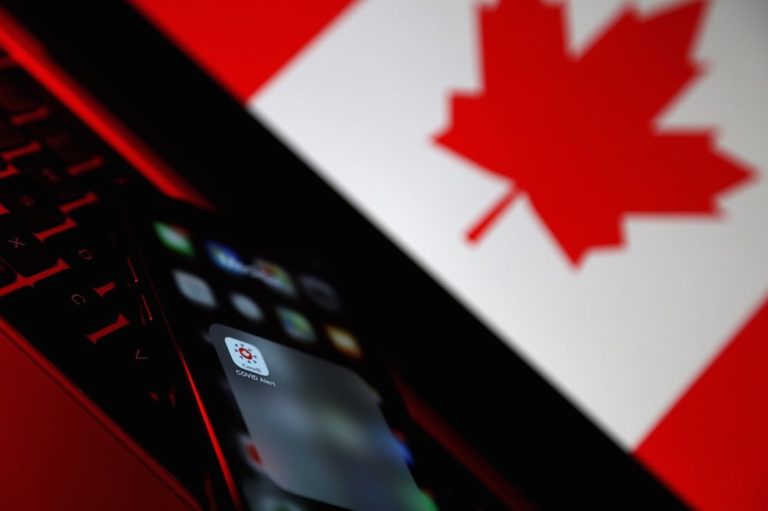
Mobile billboards highlight government’s failure to support much-needed Internet during pandemic
A mobile billboard campaign circling Parliament is demanding to know why the federal government has not supported the affordability and availability of Internet in Canada during the pandemic.

EU Digital Services Act (DSA) must support press freedom
“Free Press Unlimited advocates that the European Commission should use the DSA as an opportunity to re-balance the power dynamics between online platforms and the media, while addressing connected issues related to the spread of disinformation and online advertising.”
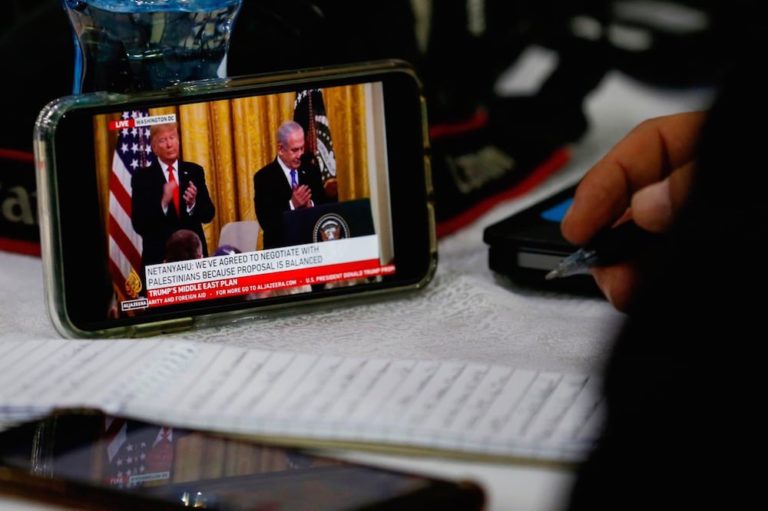
Palestine: Majority of Palestinians exposed to fake news says new study
According to new research from The Arab Center for the Advancement of Social Media (7amleh), at least 72% of Palestinians say they have been exposed to misleading news and identified Israeli authorities as a main source of misinformation.

Social media platforms are removing war crimes evidence
Social media platforms are taking down online content they consider terrorist, violently extremist, or hateful in a way that prevents its potential use to investigate serious crimes, including war crimes.
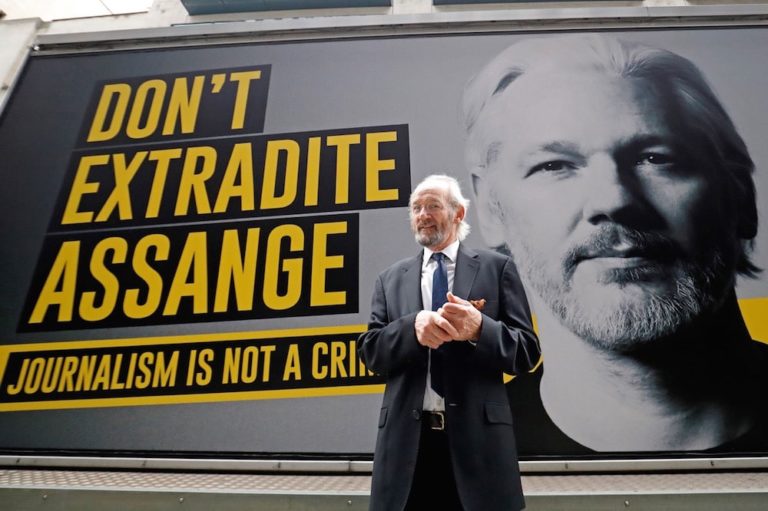
If extradited to the US Julian Assange faces 175 years in jail
“If you criminalise news gathering, you are criminalising journalism. It is a moral duty for journalists to protect sources. Many have gone to jail to protect that principle.”

How to talk to friends and family who share misinformation
Friends and family may well spread misinformation. They probably think the content is true, and they may feel they’re sharing something important. That can make it tough to know how to confront them. Here are a few suggestions.

The first wave: Six months of social media platforms responding to COVID-19
For the first six months of 2020, PEN America tracked policy, operational, and functional updates major social media companies made in response and relation to the pandemic.

COVID-19 restrictions release people’s power and finding peace through art
August in Sub-Saharan Africa: A free expression round up by IFEX’s Regional Editor Reyhana Masters, based on IFEX member reports and news from the region. An audio discussion about this piece is available here.
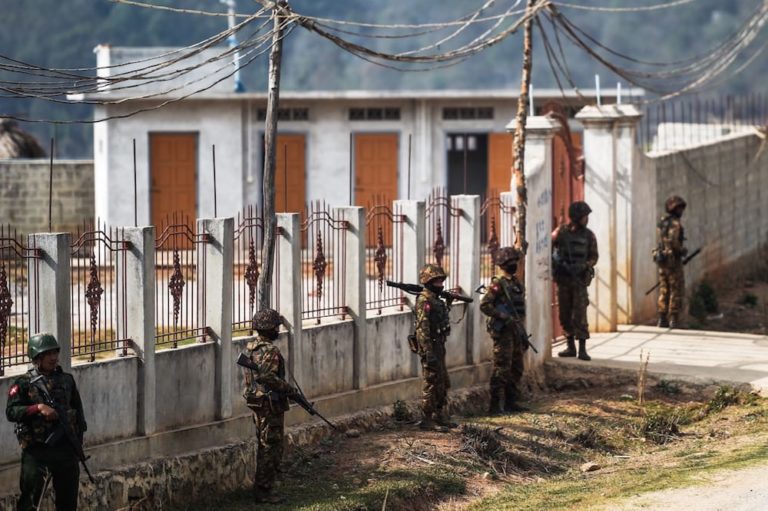
Human rights website blocked by Myanmar authorities for alleged ‘fake news’
Telecommunications operators were directed by authorities to block the ‘Justice for Myanmar’ website, which was launched early this year and published stories exposing alleged corruption in the military.

Fundamental rights under siege in Romania
The regulations and practices adopted by the Romanian authorities in response to the COVID-19 pandemic have created dangerous antecedents in crisis management that could affect democracy.

MFWA fact-checking initiative fights COVID-19 misinformation
The effectiveness of Media Foundation for West Africa’s COVID-19 fact-checking initiative is enhanced by the involvement of the diverse array of media outlets.
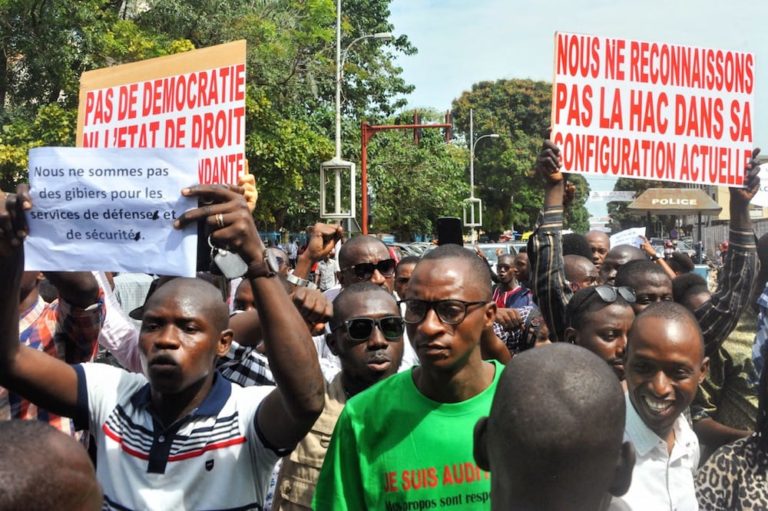
Presidential appointee to head Guinea’s media regulator
The presidential appointment of Boubabacar Yacine Diallo as the new head of Haute Autorité de la Communication (HAC) is being seen as a move to control Guinea’s media sector.

Niger passes new law on interception of communications
Niger’s recently passed interception of communications law is meant to contain security threats, but instead the surveillance implications pose a threat to free speech and online privacy.
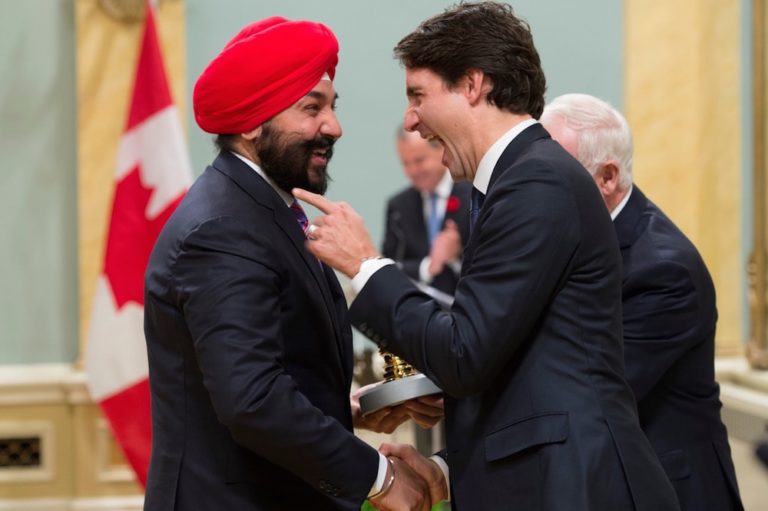
Minister Bains just undermined Canada’s best chance for affordable Internet
The government’s August 15 decision sided with Big Telecom over Canadians, and we’re already seeing Internet bills going up.

PEN Canada intervenes in Ontario Superior Court of Justice case regarding Section 91 of Elections Act
The new section of the elections Act includes prohibitions and penalties that violate the Charter right to free expression.
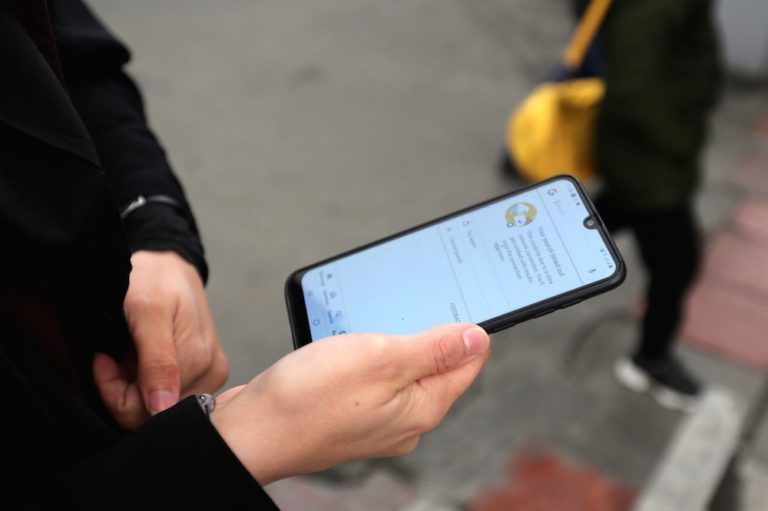
Iran: Rising worry over the future of Internet access
With Iranian authorities having repeatedly shut down the Internet during protests, the development of a national internet infrastructure has led to heightened concerns over the government’s growing capacity to cut off access to global communications.
Posts navigation
Like what you see here? Let's stay in touch
Get the latest free expression news delivered straight to your inbox.